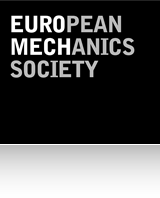MULTI-PHYSICS OF FIBROUS NETWORKS AND FIBRE-COMPOSITE MATERIALS
This Euromech colloquium focuses on recent developments in computational multi-scale models and experimental methodologies for the analysis of fibres, fibrous networks and fibre-composite materials.
Materials based on fibrous network structures play a significant role in many different physical and technical systems. These include both natural materials, such as biological networks and manufactured materials, such as paper, packaging, non-wovens, metamaterials, and composite network materials. In contrast to the conventional composites, the fibre network in these materials acts as the main load-bearing component, which singles them out into a separate category of fibre-based materials. Considering this large variety of applications, one of the key objectives of this EUROMECH colloquium is to identify the commonalities between the different classes of fibrous materials, to identify common issues encountered with such materials in different applications, and to bring together the corresponding research communities.
All fibrous materials have multi-scale structures, and their macroscopic material response is governed by the interaction between fibres, their constitutive behaviour, the inter-fibre bonding properties, the fibre geometric features, morphology and orientation, and the typical random nature of the network. Identifying the structure-property relationships controlling the response of fibrous materials is thus a challenging task, particularly since the fibres are typically characterized by non-linear and time-dependent material behaviours, which are dependent on ambient humidity and temperature. In addition, the presence of moisture or temperature fields induces deformations on the fibre and at the bond level. Further, failure commonly initiates at the scale of individual fibres, which makes it crucial to understand and predict how fracture phenomena propagate through the different length scales. This knowledge is fundamental for the proper design and optimization of fibrous network materials, to tailor their material properties for specific relevant engineering applications.
This EUROMECH colloquium will focus on the behaviour of biological networks (including collagen-based tissues and structures), cellulose networks, non-wovens and technical textiles, metamaterials, composite networks and classical composites with network reinforcement. The underlying common features between these different classes of fibrous materials, which are typically poorly appreciated and exploited, will be emphasised. This will provide the opportunity to cross-pollinate based on advances made in the different research communities and will bring needful synergy to the research fields.
We are planning an in-presence event at the Eindhoven University of Technology, Eindhoven, the Netherlands.
A hybrid format will be considered in case the COVID-19 pandemic and global travel restrictions will make it necessary.
Image courtesy of Niels Vonk/Johan Hoefnagels @ Multiscale Mechanics Laboratory, TU/e



